| Listing 1 - 10 of 12 | << page >> |
Sort by
|
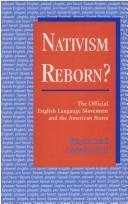
ISBN: 0813119189 Year: 1995 Publisher: Lexington, KY University Press of Kentucky
Abstract | Keywords | Export | Availability | Bookmark
 Loading...
Loading...Choose an application
- Reference Manager
- EndNote
- RefWorks (Direct export to RefWorks)
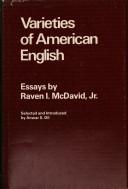
ISBN: 0804709823 9780804709828 Year: 1980 Publisher: Stanford, Calif.
Abstract | Keywords | Export | Availability | Bookmark
 Loading...
Loading...Choose an application
- Reference Manager
- EndNote
- RefWorks (Direct export to RefWorks)
English language --- Dialectology --- Variation --- Dialects --- Social aspects --- -English language --- -Germanic languages --- -Social aspects --- -Variation --- -Dialects --- Dialect literature, American --- Germanic languages --- English language - Variation - United States --- English language - Dialects - United States --- English language - Social aspects - United States
Book
ISBN: 9781107088863 9781107460881 1107088860 1107460883 9781316105313 1108365108 1108363547 1316105318 Year: 2017 Publisher: Cambridge Cambridge University Press
Abstract | Keywords | Export | Availability | Bookmark
 Loading...
Loading...Choose an application
- Reference Manager
- EndNote
- RefWorks (Direct export to RefWorks)
Is British English becoming more like American English? If so, why, and in what ways? This book compares examples of American and British language data from the 1930s, 1960s, 1990s and 2000s, to track the most important ways that both varieties are changing over time, and compares the extent to which they are following similar paths using a mixture of computer and human analysis. The analysis is carried out across several levels, including spelling differences (such as colour vs color), vocabulary (truck vs lorry), and a range of morphological, grammatical, semantic and pragmatic features. Baker explores the changing aspects of American and British society which help to explain the findings.
English language --- Social aspects --- Variation --- Taalvarianten. --- Germanic languages --- English language - Social aspects - United States --- English language - Social aspects - Great Britain --- English language - Variation - United States --- English language - Variation - Great Britain
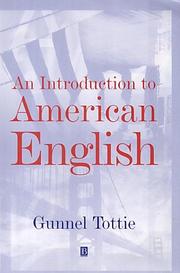
ISBN: 0631197923 0631197915 9780631197928 Year: 2002 Publisher: Oxford Blackwell Publishers
Abstract | Keywords | Export | Availability | Bookmark
 Loading...
Loading...Choose an application
- Reference Manager
- EndNote
- RefWorks (Direct export to RefWorks)
Americanisms --- English language --- Social aspects --- Amerikaans Engelse taal --- Amerikaans Engelse taal. --- Lexicology. Semantics --- America --- Americanisms. --- Pragmatiek --- Vergelijkende taalkunde --- Engelse taalkunde --- Amerika --- Pragmatics --- Comparative linguistics --- English language - United States --- English language - Social aspects - United States --- English language - Textbooks for foreign speakers

ISBN: 9789027275479 9027275475 1556197233 9781556197239 9027248834 9789027248831 9027248850 1283358328 9786613358325 1588110451 9786612162329 1282162322 9027297983 158811046X 9781588110466 9781588110459 Year: 1999 Volume: 27 Publisher: Amsterdam Philadelphia John Benjamins Pub. Co.
Abstract | Keywords | Export | Availability | Bookmark
 Loading...
Loading...Choose an application
- Reference Manager
- EndNote
- RefWorks (Direct export to RefWorks)
This volume, based on presentations at a 1998 state of the art conference at the University of Georgia, critically examines African American English (AAE) socially, culturally, historically, and educationally. It explores the relationship between AAE and other varieties of English (namely Southern White Vernaculars, Gullah, and Caribbean English creoles), language use in the African American community (e.g., Hip Hop, women's language, and directness), and application of our knowledge about AAE to issues in education (e.g., improving overall academic success). To its credit (since most books avoid the issue), the volume also seeks to define the term 'AAE' and challenge researchers to address the complexity of defining a language and its speakers. The volume collectively tries to help readers better understand language use in the African American community and how that understanding benefits all who value language variation and the knowledge such study brings to our society.
E-books --- English language --- Germanic languages --- Social aspects --- Variation --- African Americans --- Americanisms --- Black English --- Languages --- Black English. --- Americanisms. --- LANGUAGE ARTS & DISCIPLINES --- Linguistics / General --- African American English --- American black dialect --- Ebonics --- Negro-English dialects --- Languages. --- Dialects --- English language - Social aspects - United States --- African Americans - Languages --- English language - Variation - United States

ISBN: 0415114772 0415114764 9780415114769 9780415114776 Year: 1998 Publisher: London Routledge
Abstract | Keywords | Export | Availability | Bookmark
 Loading...
Loading...Choose an application
- Reference Manager
- EndNote
- RefWorks (Direct export to RefWorks)
Sociolinguistics --- English language --- Dialectology --- United States --- Discrimination --- Language and culture --- Language policy --- Speech and social status --- Social classes and language --- Social classes and speech --- Social status and language --- Social status and speech --- Speech and social classes --- Social status --- Political aspects --- Social aspects --- Variation --- Culture --- Communication policy --- Language planning --- Germanic languages --- English language - Social aspects - United States --- English language - Political aspects - United States --- English language - Variation - United States --- Speech and social status - United States --- Language and culture - United States --- Language policy - United States --- Discrimination - United States --- English language - Social aspects - United States. --- English language - Political aspects - United States. --- English language - Variation - United States. --- Speech and social status - United States. --- Language and culture - United States. --- Language policy - United States. --- Discrimination - United States.
Book
ISBN: 3820498540 9783820498547 Year: 1987 Volume: 20 Publisher: Frankfurt am Main Lang
Abstract | Keywords | Export | Availability | Bookmark
 Loading...
Loading...Choose an application
- Reference Manager
- EndNote
- RefWorks (Direct export to RefWorks)
English language --- Americanisms --- Linguistics --- Standardization --- Social aspects --- Grammar --- History --- 802.0 <73> --- 800:316 --- -Linguistics --- -English language --- -Germanic languages --- Linguistic science --- Science of language --- Language and languages --- Amerikaans --- Sociolinguistiek --- -Grammar --- Provincialisms --- Dialects --- History. --- Grammar. --- Standardization. --- -Amerikaans --- 800:316 Sociolinguistiek --- 802.0 <73> Amerikaans --- -800:316 Sociolinguistiek --- Germanic languages --- English language - United States - Standardization --- English language - Social aspects - United States --- English language - United States - Grammar --- Americanisms - History --- Linguistics - United States - History
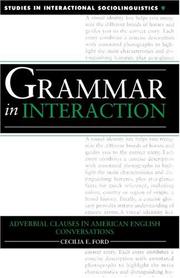
ISBN: 0521418038 0521023750 0511554273 9780521418034 9780511554278 9780521023757 Year: 1993 Volume: 9 Publisher: Cambridge Cambridge University press
Abstract | Keywords | Export | Availability | Bookmark
 Loading...
Loading...Choose an application
- Reference Manager
- EndNote
- RefWorks (Direct export to RefWorks)
Cecilia E. Ford explores the question: what work do adverbial clauses do in conversational interaction? Her analysis of this predominating conjunction strategy in English conversation is based on the assumption that grammars reflect recurrent patterns of situated language use, and that a primary site for language is in spontaneous talk. She considers the interactional as well as the informational work of talk and shows how conversationalists use grammar to coordinate their joint language production. The management of the complexities of the sequential development of a conversation, and the social roles of conversational participants, have been extensively examined within the sociological approach of Conversation Analysis. Dr Ford uses Conversation Analysis as a framework for the interpretation of interclausal relations in her database of American English conversations. Her book contributes to a growing body of research on grammar in discourse, which has until recently remained largely focused on monologic rather than dialogic functions of language.
Sociolinguistics --- English language --- Grammar --- Pragmatics --- Americanisms --- Conversation --- Américanismes --- Anglais (Langue) --- Social aspects --- Spoken English --- Adverbials --- Clauses --- Aspect social --- Anglais parlé --- Locutions et propositions adverbiales --- Propositions --- Americanisms. --- Conversation. --- Adverbials. --- Clauses. --- 802.0-56 --- -English language --- -Germanic languages --- Talking --- Colloquial language --- Etiquette --- Oral communication --- Engels: syntaxis; semantiek --- -Spoken English --- -Adverbials --- Provincialisms --- Dialects --- -Engels: syntaxis; semantiek --- 802.0-56 Engels: syntaxis; semantiek --- -Talking --- Américanismes --- Anglais parlé --- Germanic languages --- Arts and Humanities --- Language & Linguistics --- English language - United States - Adverbials. --- English language - Spoken English - United States. --- English language - Social aspects - United States. --- English language - United States - Clauses. --- -Social aspects

ISBN: 0773418695 9780773418691 0773473467 9780773473461 0889464820 9780889464827 Year: 2001 Publisher: Lewiston : The Edwin Mellen Press,
Abstract | Keywords | Export | Availability | Bookmark
 Loading...
Loading...Choose an application
- Reference Manager
- EndNote
- RefWorks (Direct export to RefWorks)
Part One interprets cultural meanings as revealed in prosodic and temporal phenomena in spoken English discourse data. The emerging theme is the (re)construction of American Indian tribal identities in terms of a newly created intertribal consciousness in an urban setting. Part Two introduces an ethnography of writing approach not only as a contribution to the intersection of linguistics and literature in general but as a valid approach to American Indian texts in particular.
English language -- Social aspects -- United States. --- English language -- United States -- Discourse analysis. --- English language -- United States -- Foreign elements -- Indian. --- English language -- Written English -- United States. --- Indians of North America -- Languages -- Influence on English. --- Indians of North America -- Languages. --- Indians of North America --- English language --- Languages in contact --- Americanisms --- English --- Languages & Literatures --- English Language --- Areal linguistics --- Germanic languages --- American aborigines --- American Indians --- First Nations (North America) --- Indians of the United States --- Indigenous peoples --- Native Americans --- North American Indians --- Languages --- Foreign elements --- Indian --- Influence on English --- Discourse analysis --- Written English --- Social aspects --- Provincialisms --- Dialects --- Culture --- Ethnology
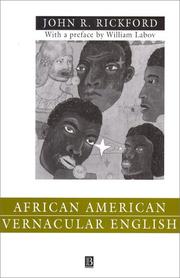
ISBN: 0631212450 9780631212454 Year: 1999 Volume: 26 Publisher: Malden, Mass. Blackwell
Abstract | Keywords | Export | Availability | Bookmark
 Loading...
Loading...Choose an application
- Reference Manager
- EndNote
- RefWorks (Direct export to RefWorks)
Sociolinguistics --- English language --- Dialectology --- United States --- Anglais des noirs --- Black English --- Ebonics --- Negerengels --- African Americans --- Language and education --- African American students --- Languages --- Social aspects --- Spoken English --- Education --- Language arts --- Language --- #KVHA:Afrikaans Engels --- #KVHA:Amerikaans Engels --- Black English. --- Afro-Amerikaans Engelse taal --- Afro-Amerikanen --- Language. --- Language arts. --- Languages. --- Verenigde Staten --- taal --- Afro-Amerikaans Engelse taal. --- taal. --- African American English --- American black dialect --- Negro-English dialects --- Afro-Americans --- Black Americans --- Colored people (United States) --- Negroes --- Africans --- Ethnology --- Blacks --- Afro-American students --- Negro students --- Students, African American --- Students --- Education&delete& --- Taal. --- Black people --- Germanic languages --- African Americans - Languages --- English language - Social aspects - United States --- English language - Spoken English - United States --- African Americans - Education - Language arts --- Language and education - United States --- African American students - Language --- United States of America
| Listing 1 - 10 of 12 | << page >> |
Sort by
|

 Search
Search Feedback
Feedback About UniCat
About UniCat  Help
Help News
News